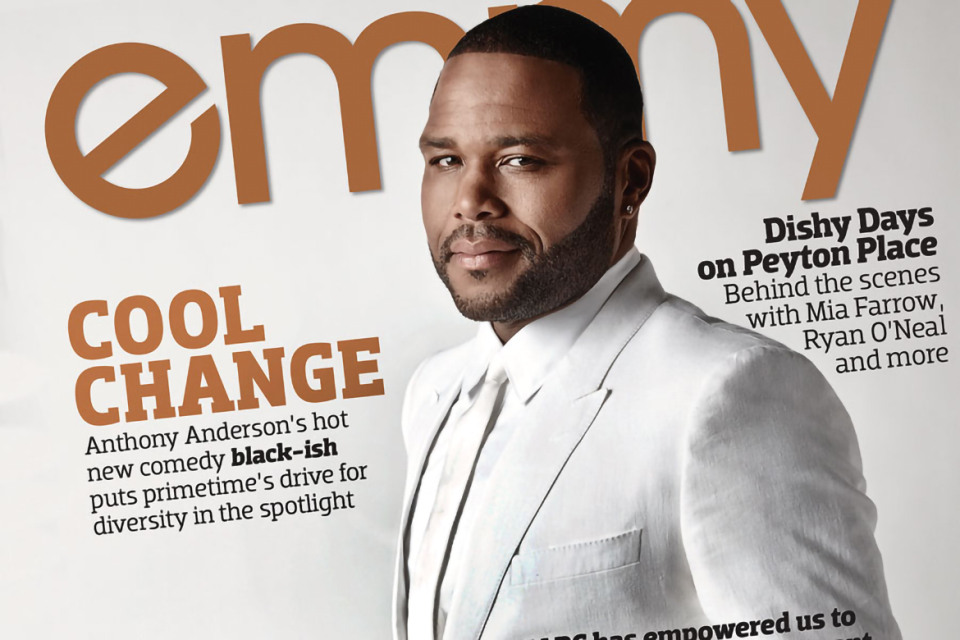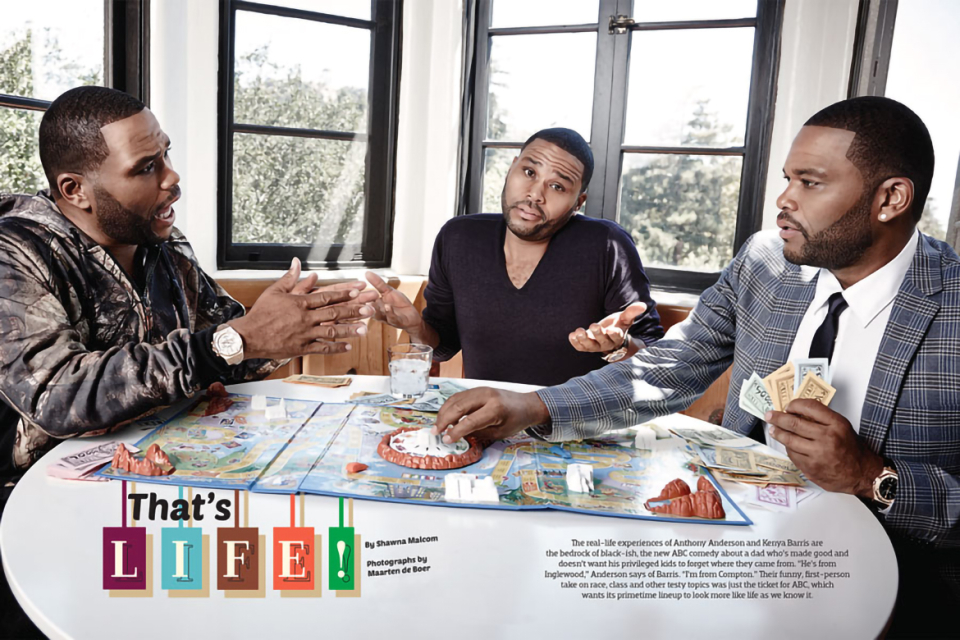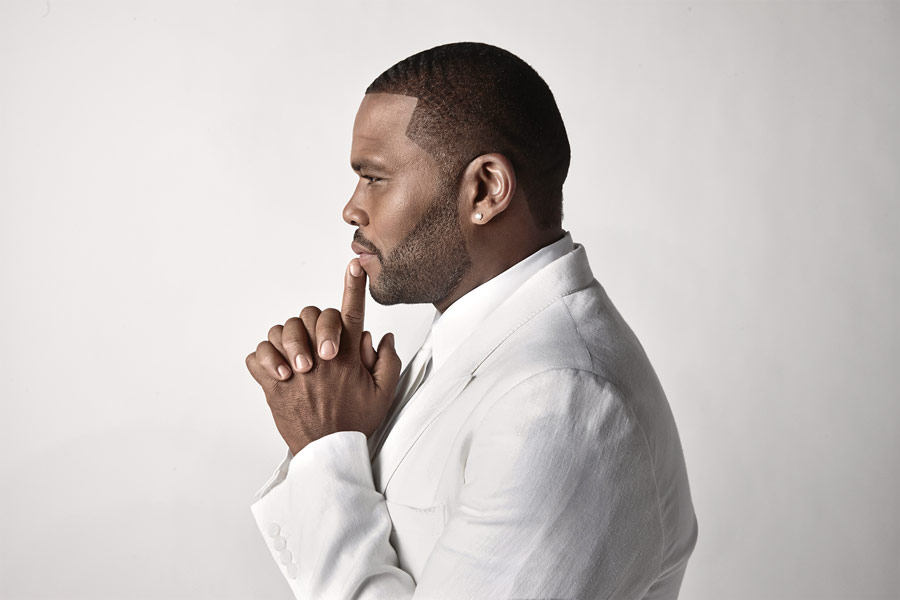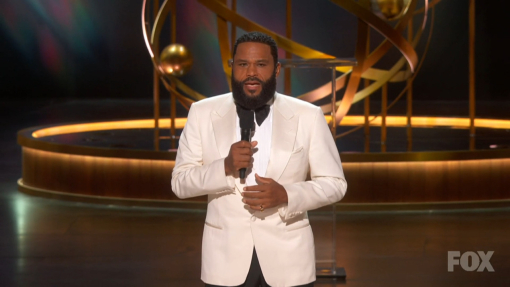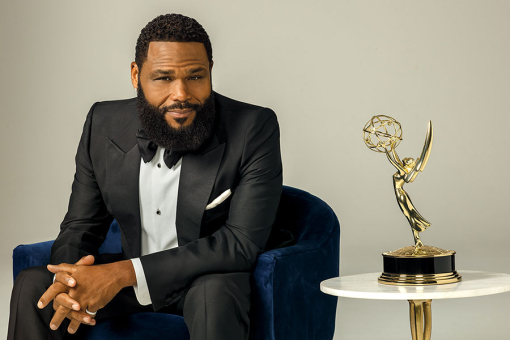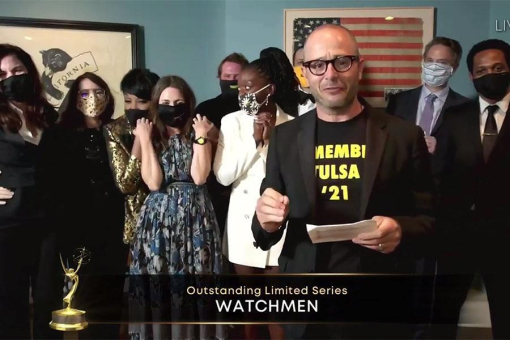"I was dealing with my son coming home and saying he doesn’t feel black.”
On a hot Friday afternoon on the Disney lot in Burbank, California, Anthony Anderson is sitting on the well-appointed kitchen set of his new ABC comedy black-ish, lunching on Mexican food and serving up some family dish. The story he’s telling happened nearly two years ago, shortly before his son, Nathan, turned 13.
“At the tail end of a heart-to-heart conversation about my unprivileged struggle growing up in Compton, California, versus my son’s privileged struggle growing up in the Valley and knowing nothing but private school,” Anderson continues, “he said, ‘Dad, for my birthday, I want a bar mitzvah.’”
The actor laughs at the memory now. But at the time, he responded, “Oh, so you really aren’t black.”
Anderson takes another bite of his enchiladas and reports that ultimately he came up with a solution both father and son could live with. “I decided,” he says, “to throw him a hip-hop bro mitzvah.”
That anecdote likely rings a bell for anyone who watched the September 24 premiere of black-ish. After Anderson, who is both the series’ star and an executive producer, recounted it to the comedy’s creator, Kenya Barris, he incorporated the true-life tale into his pilot script.
“It fit in seamlessly with the story I was telling,” Barris says — one about a successful California advertising executive, Andre “Dre” Johnson (Anderson), who frets that the upper-middle-class suburban lifestyle he and doctor-wife Rainbow (Tracee Ellis Ross) have provided their four kids has led to a loss of their cultural identity.
Eldest son Andre, Jr., (Marcus Scribner) has decided he’d rather go by “Andy,” try out for field hockey rather than the basketball team and even convert to Judaism to have a bar mitzvah like his friends.
Meanwhile, the Johnsons’ elementary-school-aged son and daughter (Miles Brown and Marsai Martin) are sufficiently colorblind not to acknowledge the race of their only other black classmate.
All of which prompts Dre to call a family meeting in the first episode and declare, “I’m gonna need my family to be black — not black-ish.”
“It has a real point of view,” says actor and executive producer Laurence Fishburne, who’s taking a rare comedic turn on the multi-generational comedy as Dre’s old-school dad, Pops. “And although it appears to be a point of view about race, it’s really about class, success and generational differences more than anything else.”
That point of view happened to be one ABC was looking for. During last year’s development season, the network put out word that it was interested in culturally diverse personal stories, and its new fall programming slate reflects that commitment.
Besides Barris’s semi-autobiographical black-ish — the first major broadcast-network comedy to focus on an African-American family in years — there’s Cristela, a comedy from up-and-coming comic Cristela Alonzo, which draws inspiration from her working-class Latino family.
And popular new legal drama How to Get Away with Murder stars black actress Viola Davis and is executive-produced by African-American producing powerhouse Shonda Rhimes.
Then there’s the network’s midseason slate, which includes Fresh Off the Boat, another family sitcom, this one adapted from chef Eddie Huang’s memoir about his Taiwanese clan’s move to Florida; and American Crime, a drama from creator–executive producer John Ridley, who won an Oscar earlier this year for writing 12 Years a Slave.
“We definitely have a mission to reflect the faces of America,” says Paul Lee, president of the ABC Entertainment Group, “which all of these shows do.”
With such a diverse lineup, the network is, in some ways, simply doing more of what it has recently proven to be successful.
The Rhimes-created Scandal, which stars Kerry Washington, became the first network drama led by an African-American actress in nearly 40 years when it premiered in 2012 and has since become ABC’s hottest hit.
In addition, Rhimes’s long-running medical hit, Grey’s Anatomy, has revolved around a multi-ethnic cast of characters since its premiere 11 years ago.
“When you look at what’s worked on ABC as a whole, it’s incredibly strong, personal voices [like] Shonda’s,” Lee says. “Strong voices are everything to us.”
And it made perfect sense, Lee maintains, to give black-ish the plum Wednesdays at 9:30 p.m. slot after Emmy winner Modern Family, a co-creation of Steven Levitan and Christopher Lloyd.
“They’re both deeply relatable family stories and very smart single-cams,” he points out. “They’re both emotional in surprising ways, and they both have authentic voices. In the end, Modern Family is Chris and Steve’s lives, and black-ish is Kenya and Anthony’s lives.”
While Anderson and Barris have long shared a manager, they’d never met until last year. Over drinks at West Hollywood’s Laurel Hardware, the actor and writer-producer discovered they had more in common than just their representation.
“He’s from Inglewood, I’m from Compton,” Anderson says of their humble origins, “and we’ve both become very successful. We’re both Leos. We talked about our wives, our lives and the privilege in which our children are growing up. We just hit it off.”
At that point, Barris — whose TV credits include The Game and America’s Next Top Model (he developed the latter with Ken Mok) — hadn’t yet penned the black-ish pilot. But he’d long been looking to his personal life for professional inspiration.
Over the past decade, he’d sold two pilot pitches to NBC about his marriage to high-school sweetheart Rainbow, now a doctor, and their struggle to juggle two high-profile careers with raising five kids. Fox had also bought another pitch, about a pivotal turning point in Barris’s childhood.
“My dad worked for General Motors and had a chemical accident when I was young,” Barris says. “We ended up getting a big settlement, and we moved from Inglewood to [affluent] Hancock Park when I was 11. I was the only black kid in my class at [private school] Crossroads. It was a very out-of-body experience, but I really appreciated this new life because I’d had the other side — whereas my kids never have.”
Eventually, Barris realized the story he really wanted to tell was a combination of his three previous ideas.
“This pilot wound up being one of the most honest things I’ve written, and I wrote it just to get it out, from a cathartic place,” he says. “My kids are a little bit less — or a watered-down, filtered version — of what I saw as black growing up. And I see a lot of their friends who aren’t black who are a little bit more of what I saw.
“Ultimately, as a society,” he continues, “I think we’re all part of each other much more now than we ever have been. That’s really what I wanted to say with this show — that we are the sum of all our parts, and we should acknowledge that.”
A couple of months after that first meeting with Anderson, Barris had cracked black-ish and called the actor to say he had a project they should work on together. And after seeing an early draft of the material, Anderson agreed. “It read beautifully,” he remembers, “and it really captured our lives today.”
Like his latest character, Anderson is an accomplished career and family man.
Since his Hollywood debut nearly 20 years ago, he’s made his mark in both comedy (The Bernie Mac Show and, last season, Guys with Kids) and drama: he earned raves as a ruthless drug kingpin on The Shield before joining Dick Wolf’s long-running Law & Order as Detective Kevin Bernard in its final three seasons. He also turned in a memorable supporting performance in Martin Scorsese’s Oscar-winning The Departed.
In his spare time, Anderson — who delights in son Nathan, now 14, and daughter Kyra, 18, with college-sweetheart wife Alvina — has also pursued projects devoted to two personal passions, golf and cooking.
Since 2012 he’s hosted Golf in America on the Golf Channel and earlier this year, he launched his first Food Network series, Eating America with Anthony Anderson, in which he visits notable food festivals across the country.
Like Barris, Anderson has also mined his personal experiences for comic material.
All About the Andersons, the 2003 sitcom he co-created and starred in for The WB, was inspired by his decision to move back in with his parents after graduating from Howard University, to save a little money until his acting career took off. His parents — telephone-operator mom Doris and dad Sterling, who’d worked in L.A.’s steel mills before opening a small chain of plus-size women’s clothing stores — weren’t exactly thrilled.
“My father put a padlock on the freezer,” Anderson remembers with a laugh. He was like, ‘I’ll give you bread and water, but I’m not giving you no meats!’ He put a pay phone in the house, so I had to put a quarter in it every three minutes...
Get the full story in the October issue of Emmy magazine—on sale now in print and digital.

